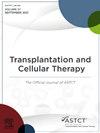Health-Related Values Discussions with Patients Undergoing Allogeneic and Autologous Stem Cell Transplant: Feasibility and Acceptability of an Early Primary Palliative Care Intervention
IF 3.6
3区 医学
Q2 HEMATOLOGY
引用次数: 0
Abstract
Background
Hematopoietic stem cell transplant (HSCT) has curative potential but also relatively high morbidity and mortality. Patients have multidimensional palliative care (PC) needs throughout the transplant process. However, PC is not routinely offered to patients with hematologic malignancies. National guidelines recommend PC concurrent with curative hematologic disease treatment, including HSCT.
Objectives
Our goal was to determine the feasibility and acceptability of incorporating early and ongoing discussions of patients’ core health-related values (HRVs) for patients with hematologic malignancies undergoing HSCT.
Study Design
We designed and implemented a pilot study evaluating the transplant team's use of a brief, structured guide with eight open-ended questions to support patients’ articulation of their HRVs. All English-speaking patients undergoing HSCT from March 2021 to March 2022 in two outpatient HSCT clinics were eligible and offered enrollment. HRV discussions were planned pretransplant, and then at 5 time points post-transplant (Day 10-14, Day 30, Day 100, 6 months, 1 year). Clinicians and patients were surveyed to assess the feasibility and acceptability of this primary PC intervention.
Results
31 patients, mostly male (61%) and white (68%), with plasma cell (58%) and myeloid (42%) diseases participated in 149 values discussions. Initial discussions averaged 17.7 minutes; subsequent discussions were 13.3 minutes. Most patients were comfortable discussing their values and indicated it was important and helpful for them, as well as beneficial for their caregivers. Patients reported feeling heard and understood by their care team following values discussions. Clinicians were comfortable having the discussions, felt they were beneficial, and indicated learning new information about their patients beyond their diagnosis.
Conclusions
Incorporating discussions of patients’ HRVs into routine HSCT care was found to be feasible and acceptable in this pilot study. Feedback from patients and providers was overwhelmingly positive. Based on these results, the program has been refined and expanded to include all patients receiving HSCT and chimeric antigen receptor T cell (CAR-T) therapy, with plans to study the clinical impact of this approach.
与接受同种异体和自体干细胞移植的患者有关的健康价值讨论:早期初级姑息治疗干预的可行性和可接受性。
背景:造血干细胞移植(HSCT)具有治疗潜力,但也有较高的发病率和死亡率。患者在整个移植过程中都需要多维的姑息治疗(PC)。然而,PC并不常规提供给血液恶性肿瘤患者。国家指南推荐PC同时治疗血液病,包括造血干细胞移植。目的:我们的目标是确定在接受造血干细胞移植的血液恶性肿瘤患者中纳入早期和持续讨论患者核心健康相关价值(hrv)的可行性和可接受性。研究设计:我们设计并实施了一项试点研究,评估移植团队使用简短的结构化指南,其中包含八个开放式问题,以支持患者对其hrv的表达。所有2021年3月至2022年3月在两家门诊HSCT诊所接受HSCT的英语患者均符合条件并纳入研究。在移植前计划HRV讨论,然后在移植后的5个时间点(第10-14天、第30天、第100天、6个月、1年)进行讨论。对临床医生和患者进行调查,以评估这种原发性前列腺癌干预的可行性和可接受性。结果:31例男性(61%)和白人(68%),浆细胞(58%)和髓系(42%)疾病患者参与了149次价值讨论。最初的讨论平均为17.7分钟;随后的讨论持续了13.3分钟。大多数病人都能坦然地讨论他们的价值观,并表示这对他们很重要,很有帮助,对他们的护理人员也有好处。患者报告说,在价值观讨论之后,他们的护理团队听到并理解了他们。临床医生很乐意进行讨论,认为讨论是有益的,并表示要学习患者诊断之外的新信息。结论:在本初步研究中,将患者hrv纳入常规HSCT治疗是可行和可接受的。病人和医生的反馈非常积极。基于这些结果,该项目已被完善并扩大到包括所有接受造血干细胞移植和CAR-T治疗的患者,并计划研究这种方法的临床影响。
本文章由计算机程序翻译,如有差异,请以英文原文为准。
求助全文
约1分钟内获得全文
求助全文
来源期刊

Transplantation and Cellular Therapy
Medicine-Hematology
CiteScore
7.00
自引率
15.60%
发文量
1061
审稿时长
51 days
 求助内容:
求助内容: 应助结果提醒方式:
应助结果提醒方式:


